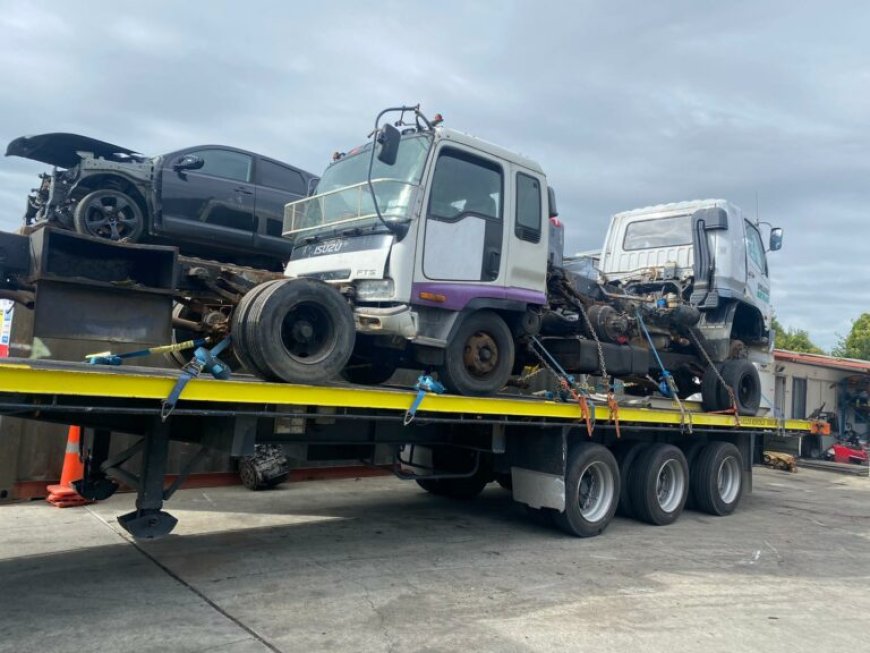What Really Happens to Your Car After You Sell It for Scrap
Discover the full process of how your car is handled after scrapping. Learn about depollution, dismantling, recycling in Australia and more with Cash for Trucks Townsville.

When you sell your car for scrap in Australia, it does not simply vanish. Every step is regulated to protect the environment and to recover useful materials. Below I explain how it works.
1. Initial Inspection and Removal
At the scrapyard, staff assess your vehicles condition. They determine whether some parts can be sold for reuse or if the car is worth recycling only for its metal content. This decision guides whether they will strip parts first or process it directly as scrap.https://www.cash4carstownsville.com.au/
2. Depollution: Making the Car Safe
Before dismantling, all hazardous fluids are removed. This includes fuel, motor oil, coolant, brake fluid and power steering fluid. Batteries, containing toxic lead and acid, are carefully extracted. Airbag inflators and gas tanks are removed due to risk of explosion or contamination.
3. Salvaging Reusable Parts
Once depollution is complete, workers remove parts that still work. Engines, gearboxes, transmissions, alternators, wiring modules, lights and tyres often have resale value. These are refurbished or sold as second?hand parts, helping reduce waste and demand for new manufacturing .
4. Crushing, Shredding and Sorting
After salvage, the remaining body is crushed into a compact cube and then shredded into small pieces. The shredded material then enters sorting processes such as magnetic separation (for steel) and eddy?current separation (for aluminium and copper), while plastics, glass and rubber are separated out.
5. Recycling of Materials
Separated metals are melted and reused in industries. Steel and aluminium are particularly valuable and are turned into new products from car components to construction materials. Plastics, glass and tyres may be recycled into building materials, road surfaces or safety surfaces .
6. Disposal of Residual Waste
Some materials cannot be recycled, such as certain plastics, seat fabrics and filter residues. These are disposed of according to environmental regulations, ensuring no toxic runoff into soil or waterways.
7. Legal and Regulatory Documentation
In most states, a licensed facility issues a certificate of destruction (or decommissioning). They forward the vehicle status to the national database so that your car is formally removed from the register. This confirms that you are no longer responsible for it and it is not roadworthy.
You also must hand in number plates. In states like Queensland and New South Wales, failure to surrender plates can result in fines of over two thousand dollars.
8. Insurance and Financial Closure
If your car was insured and written off, you will need to notify the insurer that the vehicle has been scrapped. Your policy is usually cancelled and you may receive a refund for any unused premium. If insurance paid out a settlement, the insurer may take possession of the vehicle, depending on the terms.
Why It Matters
This process ensures that harmful chemicals do not pollute the environment. By salvaging mechanical parts and recycling metals, the industry helps conserve resources and reduce waste. Up to 80 or 90?percent of a vehicles mass can be recovered and reused in a circular economy model.
Related Process in Trucks
While cars and trucks follow nearly the same recycling steps, scrap truck depollution often deals with larger fluid systems and heavier components. Companies dealing in Cash for Trucks Townsville ensure that each truck undergoes the same environmentally responsible dismantling, fluid removal, and recycling steps, just scaled up. That is why the phrase Cash for Trucks Townsville naturally fits in the context of heavy vehicle recycling without needing to mention it elsewhere directly in the narrative.
Conclusion
When you hand over your old car as scrap, it enters a regulated procedure:
-
Removal of fluids and dangerous components
-
Salvage of parts with resale value
-
Crushing, shredding and material sorting
-
Recycling of metal, plastic, glass, tyres and batteries
-
Proper disposal of non?recyclable remnants
-
Issuance of papers to close out your ownership and registration
This ensures you comply with legal requirements, protect the environment, and allow materials to live on in new forms.
Promotional Paragraph
If you are disposing of an old truck or heavy vehicle around Townsville, you might be interested in getting a reliable service that handles everything above and even offers pick?up. That is where a service like Cash 4 Cars Townsville can make a difference. They handle the full processfrom evaluation and depollution to dismantling and recyclingand offer a fair cash offer for vehicles, whether cars or trucks. Their transparent handling of the scrapping process ensures legal compliance and environmental standards are respected without burdening you with paperwork or transport.







































